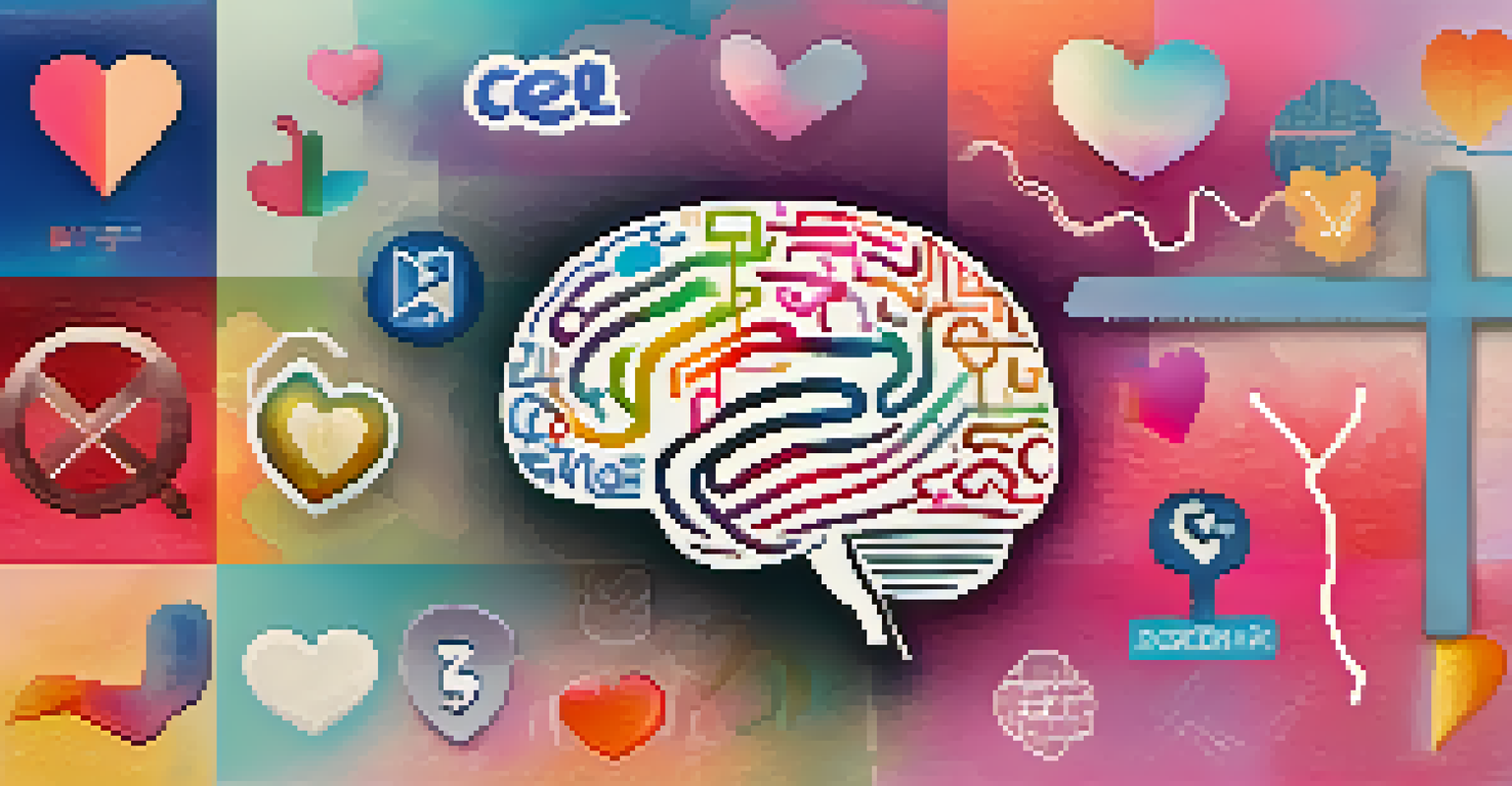Social Media's Influence on Mental Health Discourse

The Rise of Mental Health Awareness on Social Media
Social media has emerged as a powerful platform for raising mental health awareness. In recent years, we've seen an increase in campaigns and hashtags dedicated to mental health issues, which helps to destigmatize these conversations. For example, hashtags like #MentalHealthMatters and #EndTheStigma have gained traction, encouraging users to share their experiences openly. This visibility can provide comfort to those struggling, showing them they are not alone in their battles.
Social media can be a double-edged sword; it has the power to connect us but can also contribute to feelings of isolation.
Moreover, social media serves as a vital source of information. Users can access resources like articles, videos, and support groups that educate them about various mental health conditions. This democratization of information is crucial, especially for individuals who may not have access to traditional mental health services. By empowering people with knowledge, social media plays a key role in promoting mental health literacy.
However, while awareness is increasing, the quality of information shared on social platforms can vary significantly. Misinformation or oversimplified solutions can lead to confusion, highlighting the need for users to critically assess the content they consume. The challenge remains to balance awareness with accurate, supportive information, ensuring that social media is a tool for positive change.
The Double-Edged Sword of Social Media
While social media can foster supportive communities, it also has a darker side. The constant comparison to others' highlight reels can lead to feelings of inadequacy and anxiety. For instance, scrolling through perfectly curated feeds might make someone question their own life choices or self-worth. This phenomenon is often referred to as 'social comparison,' which can exacerbate existing mental health issues.

Additionally, the addictive nature of social media can lead to excessive use, which may negatively impact mental health. Spending too much time online can disrupt sleep patterns, reduce physical activity, and diminish face-to-face interactions, all of which are essential for maintaining mental well-being. It's crucial for users to find a balance that allows them to enjoy social media without letting it consume their lives.
Social Media Boosts Mental Health Awareness
Platforms like Instagram and Twitter promote mental health discussions and provide vital resources, helping to destigmatize these important conversations.
The impact of social media on mental health is not black and white; it varies from person to person. Some may find solace and community, while others might feel isolated and anxious. Understanding these varying experiences is essential in fostering a healthier online environment for everyone.
The Role of Influencers in Mental Health Conversations
Influencers play a significant role in shaping mental health discourse on social media. Many use their platforms to share personal stories about their mental health journeys, making these topics more relatable and accessible. When well-known figures open up about their struggles, it can encourage their followers to do the same, creating a ripple effect of openness and vulnerability.
The greatest weapon against stress is our ability to choose one thought over another.
However, the influence of these figures can also be problematic. Sometimes, influencers may oversimplify complex mental health issues or promote unverified treatments, potentially leading their followers astray. It's essential for audiences to remain discerning of the advice they receive, as not every influencer is a mental health professional.
Ultimately, influencers have the power to both positively and negatively impact mental health discussions. Their responsibility is to provide honest, informed content that encourages healthy conversations, while followers should approach these discussions with a critical mindset.
The Impact of Online Support Groups
Online support groups have gained popularity as safe spaces for individuals struggling with mental health issues. These virtual communities allow people to share their experiences and seek advice from others who understand their struggles. For many, these groups provide a sense of belonging and validation that they might not find in their offline lives.
Moreover, the anonymity of online platforms can encourage individuals to speak more freely about their feelings. This can be especially beneficial for those who may feel hesitant to discuss their mental health in face-to-face settings. By interacting in these supportive environments, people can find comfort and encouragement from those who truly understand their experiences.
Risks of Misinformation Are High
The spread of unverified information on social media can lead to harmful practices and discourage individuals from seeking professional help.
However, it's important to approach online support groups with caution. Not all groups maintain a safe or healthy environment, and users may encounter negative influences or misinformation. Therefore, it's crucial to seek out reputable platforms and engage in communities that prioritize mental well-being.
The Importance of Digital Mental Health Resources
In addition to online support groups, countless digital resources are available to assist individuals with mental health challenges. Websites, apps, and online therapy platforms provide accessible tools for managing mental health, from meditation apps to virtual therapy sessions. This accessibility can be a game changer for those who may find it difficult to seek help in traditional settings.
Digital resources can also offer anonymity, helping individuals feel more comfortable reaching out for help. For instance, someone may prefer to use a mental health app rather than visit a therapist in person, especially if they experience anxiety about discussing their issues face-to-face. This flexibility can encourage people to prioritize their mental health in a way that feels safe and manageable.
Nevertheless, it's essential to remember that not all digital resources are created equal. Users should research and choose reputable tools that are backed by mental health professionals to ensure they receive accurate and effective support.
Navigating the Risks of Misinformation
As social media becomes a primary source of information, the spread of misinformation poses a significant risk to mental health discussions. Unverified advice and misleading claims can lead to harmful practices or reinforce stigma surrounding mental health conditions. This makes it crucial for users to distinguish between reliable information and harmful myths.
For example, a viral post may suggest a quick fix for anxiety that lacks scientific backing, potentially leading individuals to forgo professional help. This type of misinformation can exacerbate mental health issues and deter individuals from seeking the care they need. Users must cultivate a critical eye and rely on trusted sources for accurate mental health information.
Influencers Shape Mental Health Dialogues
While influencers can encourage openness about mental health, they must ensure their messages are accurate and responsible to avoid misleading their followers.
Promoting digital literacy is essential in combating misinformation. Encouraging individuals to verify information before sharing it can help create a more informed online community, where mental health discussions are based on facts rather than fear or misunderstanding.
The Future of Mental Health Discourse on Social Media
Looking ahead, the relationship between social media and mental health will continue to evolve. As awareness grows, we may see a shift towards more inclusive and diverse conversations surrounding mental health. This shift could lead to a deeper understanding of various mental health experiences and the challenges faced by different communities.
Social media platforms are also beginning to acknowledge their role in mental health. Many are implementing features to promote well-being, such as tools to limit screen time or resources for those in crisis. These initiatives can foster a healthier online environment and encourage users to prioritize their mental health.

Ultimately, the future of mental health discourse on social media will depend on how users, influencers, and platforms navigate this complex landscape. By fostering open, informed conversations and prioritizing mental well-being, we can harness the potential of social media as a force for positive change.